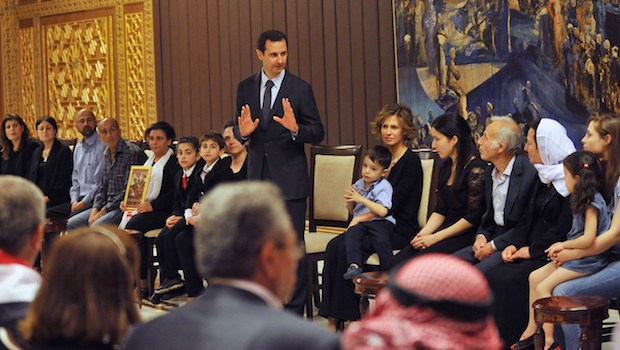The other day, when Syrian president Bashar Al-Assad announced his candidacy for a third term as president, I was reminded of a passage in Samuel Beckett’s Waiting for Godot, a classic of the theatre of the absurd. In that passage Estragon, one of the two tramps who form the cast of the play, asserts: “It can’t get any worse!” The remark draws this answer from the other tramp, Vladimir: “That’s what you think!”
The impression that there is a touch of the absurd about the Syrian situation was reinforced a day later, when the official media in Tehran reported that the Islamic Republic plans to send “monitors” to ensure the “freedom and regularity” of the Syrian election in June. The mullahs as guarantors of free elections?!
Few people would see the Syrian civil war as anything but tragic. A tragedy takes shape when those involved in a conflict are doomed to follow the course set for them by powers beyond their ken, which always ends in destruction. The tragic figure has already become everything he could become, which is all that he could become before the curtain goes up. Because he coincides with himself, he cannot change course and surprise you by evolving along a different axis.
The Syrian conflict started more than three years ago because a segment of the population was simply fed up with decades of arrogant, despotic rule by the Assad clan and its corrupt associates. Within a few months, the grievances expressed by the initial protestors in Dera’a found a surprisingly deep resonance with most—perhaps even a majority—of Syrians.
To be sure, Bashar was certainly not responsible for all that had gone wrong in Syria since the country fell under the domination of successive military juntas, always depending on narrow segments of society. In fact, it is even possible that Bashar, an indecisive weakling, may well have been a mere puppet for a clique operating in the shadows. Nevertheless, within a few weeks of the uprising in Dera’a, the call for Bashar’s departure became the unifying theme of a popular uprising that brought together a wide variety of groups with many different ideologies and political aspirations.
By 2013, the demand that Bashar must go had become the only point on which almost everyone, including many within the Assad regime, seemed to agree. At one point, a “Track II” diplomatic initiative that involved senior figures in Damascus and the administration of US President Barack Obama in Washington was built around the idea of Bashar “stepping aside” to allow the formation of a transitional coalition government. The euphemism “stepping aside” was chosen instead of “stepping down,” to reassure the Russians who opposed straight regime change in Syria.
The phrase “Bashar must go” became the central theme of all diplomatic efforts, starting with Kofi Annan’s forlorn mission to Lakhdar Brahimi’s heroic, but ultimately doomed, efforts. The first Geneva accord endorsed by both Washington and Moscow was predicated on Bashar’s departure. That would have paved the way for a more or less peaceful transition. It would have allowed the Syrian state structures to remain largely intact, preventing systemic collapse. The Ba’ath Party and its allies would have been able to retain a share of power in a new national deal, supported by a majority of Syrians and guaranteed by the major powers through the United Nations.
At the same time, acknowledging compromise as an effective means of conflict resolution would have pulled the carpet from under those on both sides whose vision of politics is based on repression and violence. More importantly, perhaps, the compromise would have saved the Syrians the ordeal caused by splits in families, clans and communities, while taming the flames of sectarian suspicion and hatred that lurked under the ashes of ages. Well, that was not to be.
Perhaps encouraged by hardline segments of the leadership in Tehran, the Damascus clique has decided not only to reject power-sharing but to humiliate the opposition by keeping Bashar in place, perhaps with a gun pressed to his temple. The official Iranian media predict that Bashar will be re-elected with “an even larger majority.” Since he won 97 percent of the votes last time, this could mean a 100 percent victory in June, repeating a feat Saddam Hussein achieved in Iraq.
The Syrian uprising started because the status quo in 2011 had become untenable. Three years of conflict have created a new status quo that is even more unstable. In both cases, the status quo was, rightly or wrongly, symbolized by Assad. Thus, if his departure was necessary to change the 2011 status quo, it is more of a necessity today.
The decision to field Bashar again buries the option of change within the regime. The issue now is regime change. This could happen in two ways. Either the clique succeeds in crushing the opposition—something I believe it cannot—or the opposition will regroup and rearm for a new round on its way to Damascus—something that, despite current odds, I believe is still possible.
The third option would be the transformation of Syria into a patchwork of non-governed territories, part of which would be under the control of the Assad clique. Assad’s candidacy is bad news not only for Syria but also for the remnants of the Ba’ath and for both Tehran and Moscow, which would have to continue financing a prolonged conflict with no prospects of victory. Tehran and Moscow would be paying for a mistress that gets uglier and more expensive by the day.
In the end, Bashar’s candidacy may even be bad for Assad himself. The “step-aside” compromise would have allowed him and his family a path to safety. His latest maneuver may close that option.
